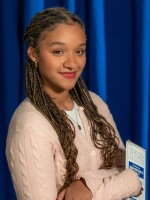A version of this conversation aired during Morning Edition on WVIA Radio.
It's an election year. We spend quite a bit of time talking to and about candidates for state and federal office, but here at WVIA, we wanted to know about what you would ask them given the chance.
Over the summer, WVIA's Lydia McFarlane created a survey to find out what issues matter the most to you. Then we took those results and asked the people on the ballot for their views to create the 2024 WVIA Voter's Guide.
-
SARAH: The Voter's Guide is available now, and Lydia is here to walk us through it. Lydia, good morning.
LYDIA: Good morning, Sarah. Thanks for having me.
SARAH: Thank you so much for your work this summer on the Voter's Guide. You were just an intern then, and now we have you here full time. So tell me about the process of creating this, starting from the survey to the finished product that we have today.
LYDIA: Absolutely, so as an intern this was one of my huge tasks this summer. And basically this summer, I created a Google form that we posted to our website and sent out newsletters just to get our audience to take this issue survey, to see what issues again, matter to you, so that we could use those topics to kind of guide what we were asking the candidates for our Voter's Guide.
SARAH: What issues when you set out, were you kind of expecting to rise to the top? And now that we have it here, in reality, was there anything that surprised you?
LYDIA: Yeah, I was really expecting economy to be number one, women's health to be up there as well. And while they were in the top five, they weren't, you know, one and two respectively. Number one was the environment. Environment coming in first place really did surprise me. I thought it would be top five, but not number one. And then in my follow-up interviews, it seemed that people were more concerned about women's health and the environment than even economy. Like, while the economy was a concern, it was more of a background concern. Although I do think that, you know, these results are consistent with national polling and national issues. I was just really surprised to see that economy didn't come out on top.
SARAH: And so, what has the response been from the candidates, the names appearing on people's ballots this November?

LYDIA: We are really thrilled with the response. We have a lot of races represented, not all of them, but a lot. We have a lot of candidates represented. We are looking for more Republican responses as well. So even though the Voter's Guide is up, we are still are looking for responses. So you know, if you haven't responded, we're still looking for that, and we are updating that Voter's Guide daily.
SARAH: All right. Now, why do you think that this format is going to be helpful for the voters in our region as we get closer and closer to November?
LYDIA: With rural races, I think it's difficult to find information on candidates. So we wanted to have just kind of a one-stop shop when it comes to Congress, when it comes to the Senate races (and) the state races. We wanted to have all of that information for voters to come right to our website and say, OK, I want to know more about Bob Casey. I want to know more about Matt Cartwright, but I also want to know more about, you know, my local representatives that are going to the state legislature.
SARAH: Now we as journalists, as people working in the news, we are pretty politically plugged in. But sometimes we get surprised as well. Did you learn anything new in this process about a candidate, or maybe about issues that are happening out in the community?
LYDIA: Oh, 100%. I feel like just reading through the responses from some of the candidates... you see all of these political advertisements and these attack ads from opponents, and it's on both sides, and you see them, and you're like, 'Oh, well, this person is anti this, or this person will be bad for the economy in this way.' And then you read these responses straight from the candidates, and you learn ... it's coming from their mouths, and not from, you know, the opposition, not from these political attack advertisements. So I think you know, it's really helpful to read through the candidates responses and just get from their mouths what they're thinking, rather than from hearsay or from advertisements and commercials. Because, again, like you said, we're politically plugged in, but it's easy to get caught up in, you know, the vitriol being spewed from each side and the advertisements and all of that, and not knowing what's real or not. So I think this is a great way, you know, as a journalist, to learn these are the people that are going to be on my ballot as well, and this is what they're saying. So I think it's a great way, from my perspective, to see through other voters' eyes in our audience, what can be learned from these candidates that we might not have known before.
SARAH: Yes, getting right at that primary source. Well Lydia, thank you so much for coming on, and look for the Voter's Guide at wvia.org.
LYDIA: Thanks Sarah, it was great being with you.




